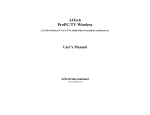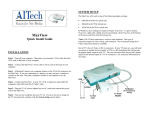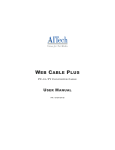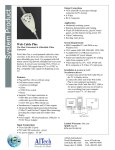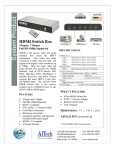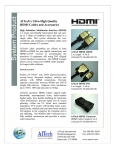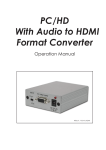Download AITech ProA User manual
Transcript
AITech ProA/V Media Extender 5GHz Digital 5 GHz Wireless Digital Media Transmitter and Receiver User Manual Table of Contents 1. Package Contents 2. Panels and Functions AV Sender AV Receiver 3. Setup Guide Connect the AV Sender to an A/V Source Connect the AV Receiver to an A/V Display 4. Troubleshooting 5. Information Federal Communications Commission Information Industry Canada Information 6. Warranty & Technical Support 1. Package Contents z z z z z z z 1 AV Sender 1 AV Receiver 2 Base units 1 IR Extender 2 A/V Composite cables (RCA) 2 Power adaptors-AC100-240V to DC 5V 2A User manual 2. Panels and Functions 2.1 AV Sender Front Panel: A1 -Power on LED A2 -Link LED A3 -Pairing Back Panel: A4 -IR output for IR Extender A5 -Pairing button A6 -Audio input (Right channel) A7 -Audio input (Lift channel) A8 -Video input (CVBS) A9 -S-Video input A10 -DC power input (5V) 2.2 AV Receiver Front Panel: B1 -Power on LED B2 -Link LED B3 -Paring LED Back Panel: B4 -IR remote control window B5 -Pairing button B6 -Audio output (Right channel) B7 -Audio output (Lift channel) B8 -Video output (CVBS) B9 -S-Video output B10 -DC power input (5V) 3. Setup Guide To enjoy a life of wireless video and audio, just connect the AV Sender to any A/V source you like (cable/satellite set-up box, PVR, DVD, media center PC, ect.) and connect the AV Receiver to the desired A/V display device, such as TV, monitor, projector or speaker in another location. 3.1 Connect the AV Sender to an A/V Source Step 1: Connect one end of the A/V cable (RCA or S-Video) to the audio (A6, A7), and video (A8 for RCA and A9 for S-Video) input jacks, and connect the other end of the A/V cable to the source device via its “AV output”. Step 2: Plug the IR Extender in the IR output jack (A4), and place the IR emitter in front of the source device (make sure that the IR emitter directly faces the IR sensor window of the source device). Step 3: Power on the AV Sender by connecting the DC plug of the Power Adapter to the DC jack (A10, and connect the power supply to an outlet. Step 4: The Power on LED (A1) shall be on. The Link LED (A2) shall start blinking in 10 seconds after power on. 3.2 Connect the AV Receiver to an A/V Display Step 5: Connect one end of the A/V cable (RCA or S-Video) to the audio (B6, B7), and video (B8 for RCA and B9 for S-Video) output jacks, and connect the other end of the A/V cable to the display device via its ”AV input”. Step 6: Keep the IR window oriented toward front when using your source device’s remote controller. Step 7: Power on the AV Receiver by connecting the DC plug of the Power Adapter to the DC jack (B10), and connect the power supply to an outlet. Step 8: The Power on LED (B1) shall be on, the Link LED (B2) shall start blinking. Step 9: The Link LED (B2) shall stop blinking and stay in solid in less than 5 minutes. By then, the wireless link is successfully established. 4. Trouble Shooting After plug the power, the Power on LED (1A or 2A) is not on? Check the power outlet and make sure the power is on. Then unplug the DC supply from the DC jack (A10 or B10) and plug it back on. Repeat this a few times if problem persists. During the setup, what if the Link LED (1B or 2B) keeps blinking and does not turn solid on? This indicates the wireless link is not up yet. Check both AV Sender and AV Receiver to make sure they are both power on. If the problem still persists, do following steps: Step 10: Go to the AV Sender. Press (and release) the Paring button (A5). The Paring LED (A3) shall be on. Step 11: Go to the AV Receiver. Press (and release) the Paring button (B5). The Paring LED (B3) shall be on. It shall quickly go off after the Link LED (B2) stop blinking and stay solid on. Note: the Link LED will go off in 45 seconds if there is no wireless link. If the Link LED continues blinking after Step 10 and 11, you may have to move the AV Receiver closer to the AV Sender and try the setup again. After the wireless link established, what if the Link LED (2A) of AV Receiver changes from solid on to blinking or even off? This indicates the loss of the wireless link. If the link cannot recover in 5 minutes, reset the power of the AV Receiver. 5. Information 5.1 Federal Communications Commission Information This device complies with Part 15 of the FCC Rules. Operation is subject to the following two conditions: (1) this device may not cause harmful interference, and (2) this device must accept any interference received, including interference that may cause undesired operation. Changes or modifications not expressly approved by the party responsible for compliance could void the use’s authority to operate the equipment. WARNING: This equipment has been tested and found to comply with the limits for a Class B device, pursuant to Part 15 of the FCC Rules. These limits are designed to provide reasonable protection against harmful interference in a residential installation. This equipment generates, uses and can radiate radio frequency energy and, if not installed and used in accordance with the instructions, may cause harmful interference to radio communications. However, there is no guarantee that interference will not occur in a particular installation. If this equipment does cause harmful interference to radio or television reception, which can be determined by turning the equipment off and on, the user is encouraged to try to correct the interference by one or more of the following measures: z z z z Reorient or relocate the receiving antenna. Increase the separation between the equipment and receiver. Connect the equipment into an outlet on a circuit different from the one which the receiver is connected to. Consult the dealer or an experienced radio/TV technician for help. This equipment complies with the FCC RF radiation exposure limits set forth for an uncontrolled environment. This equipment should be installed and operated with a minimum distance of 20 centimeters between the radiator and your body. This transmitter must not be co-located or operating in conjunction with any other antenna or transmitter. 5.2 Industry Canada Information This Class B digital apparatus complies with Canadian ICES-003. Cet appareil numerique de Ia classe B est conforme a Ia norme NMB-003 du Canada. Important Safety Instructions When using this product, basic safety precautions should always be followed to reduce the risk of fire, electric shock and inquiry, including the following: 1. Read and understand all instructions. 2. Follow all warnings and instructions marked on the product. 3. Unplug this product from the wall outlet before cleaning. Do not use liquid cleaners or aerosol cleaners. Use a damp cloth for cleaning. 4. Do not use this product on an unstable cart, stand, or table. The product may fall, causing serious damage to the product. 5. Do not use this product near water (e.g. near a bath tub, kitchen sink, or swimming poor). 6. Slots and openings in the cabinet are provided for ventilation. To protect the product from overheating, these openings must not be blocked by placing the product on the bed, sofa, rug or other similar surfaces. This product should never be placed near or over a radiator or heat register. 7. This product should be operated only from the type of power source indicated on the marking label. If you are not sure of the type of power supply to your home, consult your dealer or local power company. 8. Do not allow anything to rest on the power cord. Do not locate this product where the cord will be abused by persons walking on it. 9. Never push objects of any kind into this product through cabinet openings. Never spill liquid of any kind on the product. 10. Do not disassemble this product, but take it to authorized service facility. Opening or removing cabinet parts may expose you to dangerous voltages or other risks. 6. Contacting Technical Support You may find it most convenient to visit our website anytime at www.aitech.com. The Support area of this site contains the latest information on product usage and troubleshooting. If you require our assistance to resolve problems with the product, please e-mail our Technical Support at [email protected]. Warranty Information • If it becomes necessary to send the product to AITech for repair or modification, you must first obtain a Return Authorization Number (RA) from AITech. Product sent to AITech without an RA will be returned to the sender. Please e-mail AITech Technical Support to obtain troubleshooting information and to obtain an RA number. • Outside the United States: Please contact your local distributor. Please ensure your product is adequately cushioned to prevent damage during shipping. Please include all hardware and software that came with the product in the original packaging, so the integrity of these items can be verified by AITech technicians. It is recommended that you ship your MaxView fully insured. AITech is not responsible for loss or damage caused by shipping. Hardware Limited Warranty AITech imaging products are warranted to be free from failures due to defects in material and workmanship for one year from the date of original purchase as evidenced by a copy of the purchase receipt. During the warranty period, AITech, at AITech’s sole discretion, will repair or replace at no charge, the product which, in its opinion, is defective. The original purchaser is responsible for packing the product for shipment and charges to ship the failed product to AITech. AITech is responsible for charges to ship the repaired or replaced product. If any charge to you is involved, the replacement product will be shipped C.O.D. If the failed product has been modified in any way without the consent of AITech or if the failure is the result of misuse, abuse, or misapplication, AITech has no obligation to repair or replace the failed product. Except as expressly provided above, the hardware and accompanying written materials (including the User’s Guide) are provided “as is” without warranty of any kind including the implied warranties of merchantability and fitness for a particular purpose. AITech specifically does not warrant the operation of the hardware and will not be liable for any direct, indirect, consequent or incidental damages arising out of the use or inability to use such product even if AITech has been advised of the possibility of such damages. Some states do not allow the exclusion or limitation of liability for consequential or incidental damage, so the above limitation may not apply.








